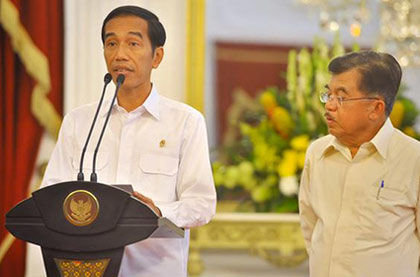
Michael Neilson
REGION (Pacific Scoop/ Pacific Media Watch): Fears that “authoritarian-era” defamation laws will be reinstated in Indonesia are unfounded, say observers of the country’s political scene.
Indonesian activists and journalists expressed outrage earlier this month, after President Joko “Jokowi” Widodo said he supported a proposal by the government to re-introduce criminal charges for insulting the president in the draft of a Criminal Code (KUHP) amendment.
Sony Ambudi, an Indonesian human rights activist of the Asia-Pacific Human Rights Coalition (APHRC) who currently resides in New Zealand, says Jokowi is merely testing out other members of Parliament, and seeing what he can get away with.
“I don’t think they will pass this law. It is a way Jokowi can test out the capacity of Indonesian members of Parliament. Why would parliamentarians pass it, as the President could then use it against them?”
An experienced observer of Indonesian media and politics, who seeks anonymity due to his position in Indonesia, also does not believe the draft will become law.
“I am confident the proposed Jokowi protection law will never get up, like so many other proposals. I suspect this issue will drag on as it has for three years and die a quiet death.”
The idea to restore the provisions was initially proposed by the previous administration of Susilo Bambang Yudhoyono in 2012, but discussion on it has been delayed until now.
Distancing move
Ambudi says President Widodo is using that fact to distance himself from the draft laws.
“He is trying to show to everybody it is not from him, but from the previous administration,” he said.
Three articles of the Criminal Code that criminalised defamation were scrapped by the Constitutional Court (MK) in 2006 following a court ruling in favour of lawyer Eggi Sudjana and activist Pandapotan Lubis, who were facing charges for slandering President Yudhoyono and his aides.
It was argued the articles undermined freedom of speech, as defined by the constitution, and caused uncertainty, as they were subject to multiple interpretations.
One interpretation ruled that burning pictures of the president and vice-president and mocking them in public were insults, and the violators were subject to a maximum of six years’ imprisonment.
Such laws were often used arbitrarily by former President Soeharto, and Indonesia’s first president, Soekarno, to arrest their critics.
Draft amendments
The current draft amendments under concern are Article 263:
"Anyone who publicly defames the President or Vice President is liable to criminal charges and is subject to imprisonment for five years maximum or is subject to Category IV fine.”
And Article 264:
“Anybody who broadcasts, show or places writings or pictures in a way that they are visible to the public, or play records so that they are hearable to the public, which contain defamation against the President or Vice President or which aims to make defamation contents known or better known to the public, is liable to criminal charges with imprisonment of five years maximum or is subject to Category IV fine maximum.”
Thousands of Indonesians have condemned the “authoritarian-era” draft laws via social media, and the Alliance of Independent Journalists (AJI), based in Indonesia, released several press releases condemning the proposals.
An excerpt from a statement on August 15 by Suwarjono, the chairman of AJI reads:
“The first victims if those articles are reinstated would be the press. These articles on defamation of heads of state are flexible and can be arbitrarily interpreted. If a journalistic source or the media becomes critical, the rulers can easily gag them.”
This view is also supported by the Paris-based Reporters Sans Frontières (RSF) media freedom agency.
“We worry that this amendment becomes a tool to silence critics, specially as Indonesia has a growing number of criminal defamation charges against media,” says general-secretary Christophe Deloire.
“It would definitely lead to more self-censorship on issues related to the President,” he told Pacific Scoop in a statement.
Deloire says Indonesia’s World Press Freedom Index ranking has fallen dramatically in the past four years, and the country now ranks 138th out of 180 countries.
Political journalist and media freedom advocate Brent Edwards, chair of the print and media arm of the Engineering, Printing and Manufacturing Union in New Zealand, says the EPMU opposes any moves to restrict freedom of press or to place restrictions on journalists reporting news free of fear or favour.
“My understanding is this legislation will have a chilling effect on journalism so we believe it is a backward step for Indonesia.”
Legal misunderstanding
Indonesian journalist Hera Khaerani says she does not believe the law will pass, and that it is unnecessary.
“President Joko Widodo doesn’t need the presidential insult law to exist again. We have a similar law, covering all citizens, regulating insults.
“Of course we should differ insult from criticism, because criticism is good… [But] insulting a president is not healthy for democracy.
“He doesn’t have to feel insecure about not being protected by law when getting insults. So I see it is a mere lack of understanding of the law,” she says.
Even though the MK scrapped the three defamation articles from the Criminal Code in 2006, a person can still be charged for defamation if someone files a report against that person, as per articles 310 and 311.
Ambudi said much of the concern from the activists is unfounded.
“Unfortunately some activists haven’t properly read the draft, yet they make strong reactions. But fortunately they are only a few.
“I don’t think the law will be passed, because the other parliamentarians are so afraid of it.”
However, RSF’s Christophe Deloire says President Widodo has also made concerning statements about restricting freedom of the press, including in a speech to the People’s Consultative Assembly, on August 14, when he is reported to have said:
“These days people feel they are ultimately free to behave and voice their opinions as they like. This is counterproductive, when the media is focused on higher ratings instead of guiding the public to be virtuous and to have a productive work culture”.
This work is licensed under a Creative Commons Attribution-NonCommercial 3.0 New Zealand Licence.




